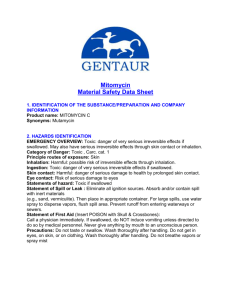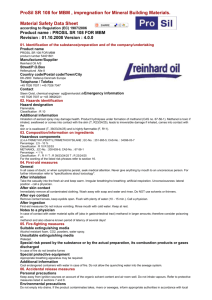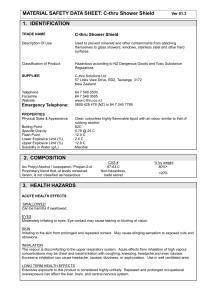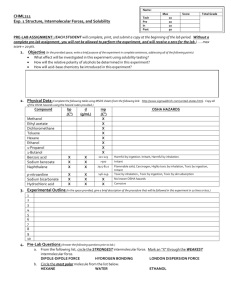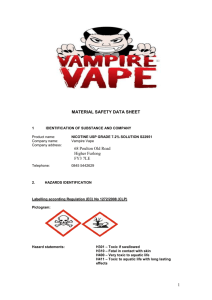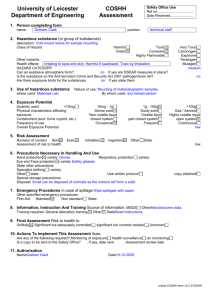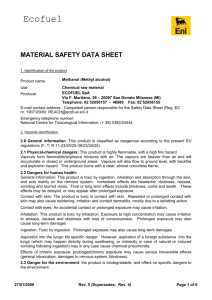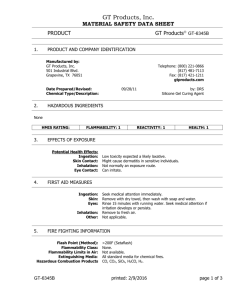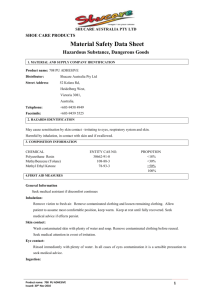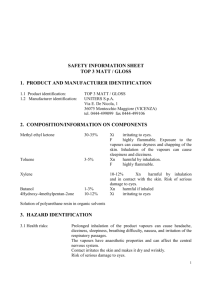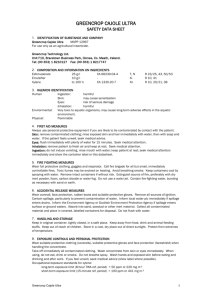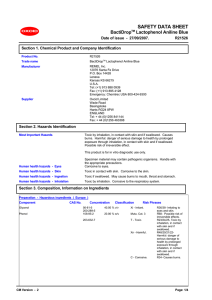SAFETY DATA SHEET
advertisement
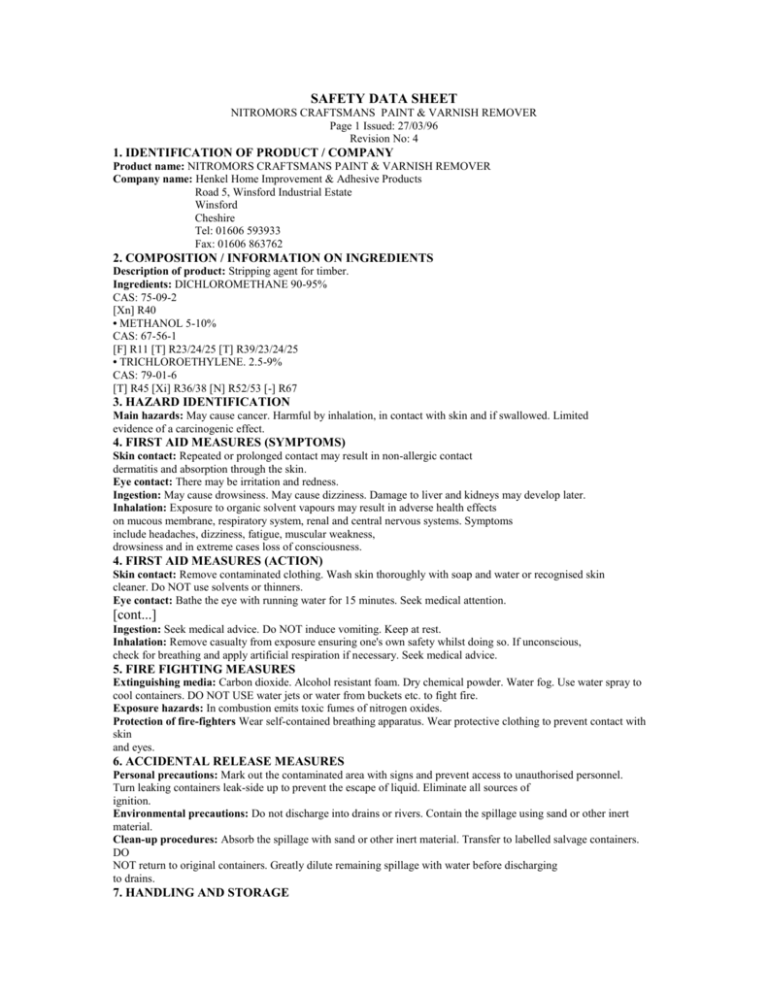
SAFETY DATA SHEET NITROMORS CRAFTSMANS PAINT & VARNISH REMOVER Page 1 Issued: 27/03/96 Revision No: 4 1. IDENTIFICATION OF PRODUCT / COMPANY Product name: NITROMORS CRAFTSMANS PAINT & VARNISH REMOVER Company name: Henkel Home Improvement & Adhesive Products Road 5, Winsford Industrial Estate Winsford Cheshire Tel: 01606 593933 Fax: 01606 863762 2. COMPOSITION / INFORMATION ON INGREDIENTS Description of product: Stripping agent for timber. Ingredients: DICHLOROMETHANE 90-95% CAS: 75-09-2 [Xn] R40 • METHANOL 5-10% CAS: 67-56-1 [F] R11 [T] R23/24/25 [T] R39/23/24/25 • TRICHLOROETHYLENE. 2.5-9% CAS: 79-01-6 [T] R45 [Xi] R36/38 [N] R52/53 [-] R67 3. HAZARD IDENTIFICATION Main hazards: May cause cancer. Harmful by inhalation, in contact with skin and if swallowed. Limited evidence of a carcinogenic effect. 4. FIRST AID MEASURES (SYMPTOMS) Skin contact: Repeated or prolonged contact may result in non-allergic contact dermatitis and absorption through the skin. Eye contact: There may be irritation and redness. Ingestion: May cause drowsiness. May cause dizziness. Damage to liver and kidneys may develop later. Inhalation: Exposure to organic solvent vapours may result in adverse health effects on mucous membrane, respiratory system, renal and central nervous systems. Symptoms include headaches, dizziness, fatigue, muscular weakness, drowsiness and in extreme cases loss of consciousness. 4. FIRST AID MEASURES (ACTION) Skin contact: Remove contaminated clothing. Wash skin thoroughly with soap and water or recognised skin cleaner. Do NOT use solvents or thinners. Eye contact: Bathe the eye with running water for 15 minutes. Seek medical attention. [cont...] Ingestion: Seek medical advice. Do NOT induce vomiting. Keep at rest. Inhalation: Remove casualty from exposure ensuring one's own safety whilst doing so. If unconscious, check for breathing and apply artificial respiration if necessary. Seek medical advice. 5. FIRE FIGHTING MEASURES Extinguishing media: Carbon dioxide. Alcohol resistant foam. Dry chemical powder. Water fog. Use water spray to cool containers. DO NOT USE water jets or water from buckets etc. to fight fire. Exposure hazards: In combustion emits toxic fumes of nitrogen oxides. Protection of fire-fighters Wear self-contained breathing apparatus. Wear protective clothing to prevent contact with skin and eyes. 6. ACCIDENTAL RELEASE MEASURES Personal precautions: Mark out the contaminated area with signs and prevent access to unauthorised personnel. Turn leaking containers leak-side up to prevent the escape of liquid. Eliminate all sources of ignition. Environmental precautions: Do not discharge into drains or rivers. Contain the spillage using sand or other inert material. Clean-up procedures: Absorb the spillage with sand or other inert material. Transfer to labelled salvage containers. DO NOT return to original containers. Greatly dilute remaining spillage with water before discharging to drains. 7. HANDLING AND STORAGE Handling requirements: Ensure there is sufficient ventilation of the area. Avoid direct contact with the substance. Smoking is forbidden. Vapours are heavier than air and may spread along the floor. Storage conditions: Store in cool, well ventilated area. Keep container tightly closed. Keep away from sources of ignition. Avoid incompatible materials and conditions - see section 10 of SDS. Petroleum (Consolidation) Act 1928 applies. HSE Guidance note: Storage of Packaged Dangerous Substances HS (G) 71 should be observed. Observe the label precautions. 8. EXPOSURE CONTROLS / PERSONAL PROTECTION Ingredients: DICHLOROMETHANE TWA (8 hr exposure limit): 350 mg/m3 STEL (15 min exposure limit): 1060 mg/m3 • METHANOL TWA (8 hr exposure limit): 266 mg/m3 STEL (15 min exposure limit): 333 mg/m3 • TRICHLOROETHYLENE. TWA (8 hr exposure limit): 550 mg/m3 STEL (15 min exposure limit): 820 mg/m3 Engineering measures: Ensure there is sufficient ventilation of the area. Occupational Exposure Limits (OEL'S) listed are taken from EH40/2002. Respiratory protection: If ventilation is insufficient to maintain concentrations below the relevant OEL'S, suitable respiratory protective equipment should be worn. Air fed respiratory protection should be worn when product is being sprayed and exposure of the sprayer cannot be controlled below OES. Wet sanding should be used wherever possible. If exposure to dust cannot be avoided by local exhaust ventilation, suitable respiratory protective equipment should be used. Hand protection: Protective gloves made of neoprene, nitrile, polythene or PVC, butyl rubber, natural rubber or PTFE. Eye protection: Goggles to BS EN 166 349B. Skin protection: Appropriate protective clothing and boots. 9. PHYSICAL AND CHEMICAL PROPERTIES State: Gel. Colour: Colourless Oxidising: Non-oxidising (by EC criteria) Solubility in water: Not miscible Flammability limits %: lower: 0.8 Relative density: 1.2 10. STABILITY AND REACTIVITY Stability: Stable under normal conditions. Materials to avoid: Acids. Oxidising agents. Alkalis. Haz. decomp. products: In combustion emits toxic fumes of nitrogen oxides. 11. TOXICOLOGICAL INFORMATION Ingredients: METHANOL ORL RAT LC50 5628mg/kg • TRICHLOROETHYLENE. ORL RAT LD50 5650mg/kg 12. ECOLOGICAL EFFECTS Mobility: Heavier than air. Insoluble in water. Short / long-term effects: Air Pollution Control or Integrated Pollution Control regulations made under the Environmental Protection Act may apply. 13. DISPOSAL CONSIDERATIONS Waste disposal: Disposal operations: D2 NB: Observe all local and national regulations. To be disposed of in accordance with Control of Pollution Act 1974 and Environmental Protection Act 1990. Special Waste Regulations apply. 14. TRANSPORT INFORMATION ADR / RID UN no: 2810 ADR Class: 6.1 Hazard ID no: 60 Item no: 25°(c) Labelling: 6.1 Shipping name: TOXIC LIQUID, ORGANIC, N.O.S. (DICHLOROMETHANE, METHANOL) IMDG / IMO UN no: 2810 Class: 6.1 Packing group: III EmS: 6.1-02 Marine pollutant: NO Labelling: 6.1 IATA / ICAO UN no: 2810 Class: 6.1 Packing group: III Packing instructions: 618 Quantity: 220 L Labelling: 6.1 15. REGULATORY INFORMATION Hazard symbols: Toxic. Risk phrases: R45: May cause cancer. R20/21/22: Harmful by inhalation, in contact with skin and if swallowed. R40: Limited evidence of a carcinogenic effect. Safety phrases: S23: Do not breathe vapour. S24: Avoid contact with skin. S36/37: Wear suitable protective clothing and gloves. S51: Use only in well-ventilated areas. S53: Avoid exposure - obtain special instructions before use. Restricted to professional users. Note: The regulatory information given above only indicates the principal regulations specifically applicable to the product described in the safety data sheet. The user's attention is drawn to the possible existence of additional provisions which complete these regulations. Refer to all applicable national, international and local regulations or provisions. 16. ADDITIONAL INFORMATION Additional information: Risk phrase text from Section 2: R11: Highly flammable. R36/38: Irritating to eyes and skin. R23/24/25: Toxic by inhalation, in contact with skin and if swallowed. R39/23/24/25: Toxic: danger of very serious irreversible effects through inhalation, in contact with skin and if swallowed. R40: Limited evidence of a carcinogenic effect. R52/53: Harmful to aquatic organisms, may cause long-term adverse effects in the aquatic environment. [cont...] R67: Vapours may cause drowsiness and dizziness. This data sheet does not constitute a User's Assessment of Workplace Risk as required by HSW Act, COSHH, Management of Health and Safety at Work Regulations, or other safety legislation. Do not use for purposes other than those shown in Section 1 without referring to the supplier. Fiddes & Son give this information in good faith for the guidance of users but it is without warranty or liability. Legal disclaimer: The above information is believed to be correct but does not purport to be all inclusive and shall be used only as a guide. This company shall not be held liable for any damage resulting from handling or from contact with the above product. [final page]
